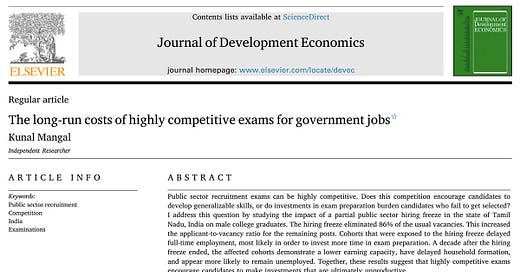Introduction
Public sector recruitment exams are a common method used globally to select government employees. These exams are known for their high competitiveness, especially in countries where public sector jobs are significantly more valuable than private sector ones. A recent study by Kunal Mangal, published in theJournal of Development Economics, investigates the long-term socio-economic impacts of such competitive exams on candidates who fail to secure government positions.
Key Findings
The study focuses on the impact of a partial hiring freeze implemented by the Tamil Nadu government in India between 2001 and 2006. This policy led to an 86% reduction in government job vacancies, significantly increasing the competition for the remaining positions. The main findings of the study are:
Increased Competition: The hiring freeze resulted in a dramatic increase in the applicant-to-vacancy ratio, making the exams even more competitive.
Delayed Employment: Candidates exposed to the hiring freeze delayed their entry into full-time employment, likely investing more time in exam preparation.
Long-Term Economic Impact: A decade after the hiring freeze ended, the affected cohorts exhibited lower earning capacities, delayed household formation, and higher unemployment rates.
Household Dynamics: Elder members of the households of affected candidates delayed their retirement to compensate for the financial shock.
Implications
The findings suggest that highly competitive exams may lead to significant long-term costs for unsuccessful candidates. These costs include not only economic disadvantages but also social and psychological impacts. The study highlights the need for policymakers to consider these long-term effects when designing public sector recruitment processes.
Conclusion
The research underscores the importance of balancing the benefits of competitive exams, such as improved candidate quality, with the potential long-term costs to those who do not succeed. Future policies might benefit from incorporating measures that mitigate these negative impacts, ensuring a more equitable approach to public sector recruitment.
Disclaimer
This summary is based on the article "The long-run costs of highly competitive exams for government jobs" by Kunal Mangal, published in theJournal of Development Economics. For more detailed information, you can access the full article here.
By providing a comprehensive overview of the study's findings and implications, this newsletter post aims to inform readers about the significant long-term costs associated with highly competitive public sector exams.
More Updates by ISAIL
My AI & Law Book completes 5 years of publication
Hmm, I didn't realise time runs so fast... When I had authored my first book on #artificialintelligence and #internationallaw, the first edition of "Artificial Intelligence Ethics and International Law" was completed by March 2019, first week. After a round of proof-reading, edits and dedication, the first edition of the book was out in public.
Why the Indian Bid to Make GPAI an AI Regulator is Unpreprared
Folks, your beloved Visual Legal Analytica by Indic Pacific Legal Research LLP (vla.digital) has now completed 2 years of its existence! Must say that VLA.Digital has changed the way I wanted to express and discuss legal and policy ideas for everyone's benefit in the
AI Patentability is Messy: Check out the AI and Intellectual Property Training Programme
In the times when using third party #artificialintelligence LLMs is becoming a fad, it is natural to ask some basic questions around what copyright or patent law frameworks may be applied, and in what way. I have addressed AI patentability issues in detail since the early 2020s in our insights at







